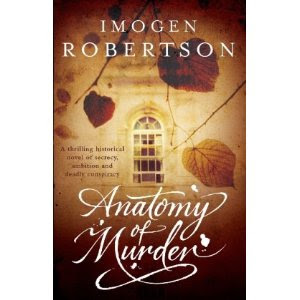Before I could start on my revised list for January I had one of the far too many crime novels that I read over the holiday period to finish; this one for my Wednesday morning book group.
In fact, Imogen Robertson's Anatomy of Murder is a cut above a lot of the other books I read over the Christmas period. Set in 1781, it is her second novel and like the first, Instruments of Darkness, deals with the fortunes of Mrs Harriet Westerman and Mr Gabriel Crowther, a sort of CSI team of their day. These two characters were brought together by force of circumstances and the coincidence of their locale in the first book to solve the mystery of the Earl of Sussex and his missing heir after the discovery by Harriet of a dead man bearing the Sussex family coat of arms. The second in the series finds them in London where Harriet's Royal Navy husband is hospitalised having sustained a blow to the head while pursuing the King's enemies.
The thrust of the story is to do with the uncovering of a spy-ring set on revealing the secrets of the country's forces to any foreign government that is prepared to pay. In fact one of the things that makes much of the book ring true to modern ears is the accommodation that has to be reached with villains who are apprehended because of the service they have done the British Government in the past. In the course of discovery Robertson takes us into the world of Georgian opera and the public's love affair with the castrato voice as well as introducing us to some very likeable low-life Londoners who fortunately look set fair to reappear in future volumes.
There are several reasons why I'm actually very glad to have read this book. Firstly, I am always pleased when a good first novel is followed by an even better second. No one book wonder here then. Secondly, this is a period about which I know very little and when linked with my third reason that is important because the other feature that makes this a book worth reading is the quality of the research that has gone into it. The acknowledgements make it clear that Robertson has gone to considerable trouble to make sure that her facts are correct and the accuracy of what she has to say about the one area I do know something about, the theatre of the period, suggest that her other background reading has been put to similar good use.
There is a third book due out in April, Island of Bones, and although in general I want to read less crime fiction this year, that is one that will be on my library list as soon as it becomes available.
Annie

No comments:
Post a Comment